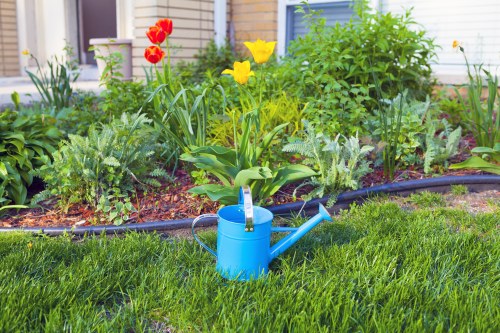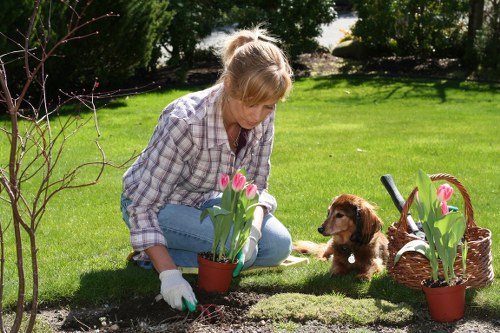Hedge Trimming in Hayes: Enhancing Your Landscape's Beauty

Introduction to Hedge Trimming
Hedge trimming is an essential aspect of maintaining a beautiful and healthy garden. In Hayes, where curb appeal is highly valued, professional hedge trimming services can make a significant difference. Properly trimmed hedges not only enhance the aesthetic appeal of your property but also promote the overall health of your plants.
Whether you're looking to shape your hedges for a formal look or simply maintain their current form, understanding the fundamentals of hedge trimming is crucial. This article delves into the various aspects of hedge trimming in Hayes, offering valuable insights and tips for homeowners.
From selecting the right tools to understanding the best times for trimming, we cover everything you need to know to keep your hedges in pristine condition.

The Importance of Regular Hedge Trimming
Regular hedge trimming offers numerous benefits that go beyond mere aesthetics. It ensures that your hedges remain healthy, free from pests, and well-shaped. Here are some key reasons why regular trimming is essential:
- Health Maintenance: Trimming removes dead or diseased branches, promoting better air circulation and reducing the risk of infestations.
- Encourages Growth: Proper trimming stimulates new growth, leading to fuller and more vibrant hedges.
- Enhances Curb Appeal: Well-maintained hedges significantly enhance the visual appeal of your property.
- Safety: Keeping hedges trimmed away from pathways and structures prevents accidents caused by overgrown branches.
In Hayes, where gardens are a focal point of many homes, regular hedge trimming is a key component of landscape maintenance.

Best Practices for Hedge Trimming
Adhering to best practices ensures that your hedges remain healthy and visually appealing. Here are some guidelines to follow:
1. Choose the Right Time
The timing of hedge trimming is crucial. The best times to trim hedges in Hayes are:
- Late Spring: After the initial growth spurt, which allows for shaping before the summer heat.
- Early Autumn: Before the first frost, which helps the hedge recover during the cooler months.
Avoid trimming during extreme weather conditions, as this can stress the plants.
2. Select Appropriate Tools
Using the right tools ensures a clean and efficient trim. Essential tools include:
- Hedge Shears: For precise and clean cuts.
- Pruners: For thicker branches.
- Loppers: For larger hedges that require more force.
Ensure that all tools are sharp and well-maintained to prevent damage to the plants.
3. Technique and Approach
Proper technique is vital for healthy hedges:
- Start with the Bottom: Trim from the bottom up to ensure a uniform shape and prevent lower branches from overshadowing the upper ones.
- Maintain Shape: Depending on the desired look, maintain a natural or formal shape.
- Don't Overtrim: Removing too much foliage can stress the hedge and hinder growth.

Choosing the Right Hedges for Your Hayes Garden
Selecting the appropriate type of hedge is fundamental to achieving the desired look and functionality. Here are some popular hedge options suitable for Hayes:
1. Boxwood
Boxwood is a traditional choice for formal gardens. It's dense, evergreen, and can be meticulously shaped.
2. Privet
Privet hedges are fast-growing and versatile, ideal for both privacy screens and ornamental purposes.
3. Laurel
Laurel is hardy and provides excellent coverage. It's perfect for creating tall, impenetrable barriers.
4. Yew
Yew hedges are resilient and can thrive in various conditions, making them a popular choice for Hayes gardens.
- Consider Growth Rate: Fast-growing hedges require more frequent trimming.
- Climate Compatibility: Ensure the hedge species is well-suited to Hayes' climate.
- Maintenance Needs: Some hedges require more care and attention than others.

Hiring Professional Hedge Trimming Services in Hayes
While DIY trimming can be rewarding, hiring professional hedge trimming services offers several advantages:
1. Expertise and Experience
Professionals possess the knowledge and skills to trim hedges effectively, ensuring optimal health and appearance.
2. Time-Saving
Hiring experts allows you to save time and focus on other aspects of garden maintenance or personal activities.
3. Specialized Equipment
Professionals have access to specialized tools and equipment that facilitate efficient and precise trimming.
4. Consistent Results
With professional services, you can expect consistently well-trimmed hedges that enhance your garden's overall look.
- Cost-Effective: Although there is an upfront cost, professional trimming can save money in the long run by preventing damage and promoting plant health.
- Safety: Professionals are trained to handle equipment safely, reducing the risk of accidents.
- Customized Services: Services can be tailored to meet your specific needs and preferences.
How to Choose the Right Service Provider
When selecting a hedge trimming service in Hayes, consider the following:
- Reputation: Look for reviews and testimonials to gauge the quality of service.
- Experience: Choose a company with extensive experience in hedge trimming.
- Certifications: Ensure that the service provider is certified and insured.
- Pricing: Compare quotes from different providers to find a competitive rate.
Investing in a reputable service ensures that your hedges receive the best care possible.

DIY Hedge Trimming Tips
If you prefer to undertake hedge trimming yourself, here are some essential tips to ensure success:
1. Plan Your Trim
Before you begin, have a clear plan of the shape and size you want your hedges to achieve. This helps maintain consistency and prevents over-trimming.
2. Use the Right Tools
Ensure all your tools are sharp and clean. Dull tools can cause ragged cuts, leading to disease and pest issues.
3. Trim Gradually
Instead of attempting to achieve the desired shape in one go, trim your hedges gradually over several sessions. This reduces stress on the plants.
4. Maintain Proper Technique
Make smooth, deliberate cuts to encourage healthy growth. Avoid tearing or pulling branches.
5. Clean Up
After trimming, remove all cuttings and debris from your garden. This prevents the spread of diseases and keeps your garden tidy.
- Safety First: Always wear protective gear, such as gloves and safety glasses.
- Check Weather Conditions: Trim on dry days to prevent fungal infections.
- Regular Maintenance: Regular trimming reduces the need for drastic cuts later.
By following these tips, you can achieve professional-looking results even as a DIY enthusiast.

Common Mistakes to Avoid
Avoiding common mistakes ensures the health and appearance of your hedges. Here are some pitfalls to watch out for:
1. Over-Trimming
Removing too much foliage can stress the plant, leading to poor growth and increased susceptibility to pests and diseases.
2. Trimming at the Wrong Time
Trimming during extreme weather or off-season can damage the hedge and hinder its growth.
3. Using Improper Tools
Using dull or unsuitable tools can cause uneven cuts and damage the plant tissue.
4. Ignoring Plant-Specific Needs
Different hedge species have varying trimming requirements. Ignoring these can lead to suboptimal results.
5. Neglecting Safety Precautions
Failing to use protective gear or handle tools safely can result in accidents and injuries.
- Consistency: Maintain a consistent trimming schedule to avoid overgrowth.
- Proper Shaping: Focus on maintaining the natural form or desired shape without forcing unnatural lines.
- Inspection: Regularly inspect your hedges for signs of disease or pest infestation.
Being aware of these mistakes helps in maintaining healthy and attractive hedges.

Seasonal Hedge Trimming Tips
Each season offers unique opportunities and challenges for hedge trimming. Here's how to approach hedge maintenance throughout the year in Hayes:
Spring
Spring is an excellent time for major hedge trimming. As plants start to grow, trimming encourages dense, healthy growth. Focus on:
- Removing any winter damage.
- Shaping the hedge before the growing season kicks in.
- Pruning back any overly long branches.
Summer
During summer, focus on maintaining the shape and preventing the hedge from becoming overgrown. Tips include:
- Regular trimming to manage growth.
- Watering adequately to support new growth.
- Monitoring for pests and diseases.
Autumn
Autumn trimming prepares hedges for winter, ensuring they remain healthy during the colder months. Steps include:
- Light trimming to remove any diseased or damaged branches.
- Encouraging hardier growth before dormancy.
- Cleaning up fallen leaves and debris.
Winter
Winter is generally a dormant period for hedges, so extensive trimming is not recommended. Instead, focus on:
- Protecting hedges from harsh weather conditions.
- Avoiding heavy trimming that could damage the plant.
- Planning for spring trimming when growth resumes.
Understanding seasonal nuances ensures that your hedges remain robust and attractive year-round.

Environmental Benefits of Hedge Trimming
Hedge trimming not only enhances the visual appeal of your garden but also provides several environmental benefits:
1. Promotes Biodiversity
Well-maintained hedges can serve as habitats for various species of birds, insects, and other wildlife, promoting biodiversity in your area.
2. Air Quality Improvement
Healthy hedges contribute to better air quality by absorbing pollutants and producing oxygen.
3>Climate Regulation
Hedged areas can help regulate the microclimate of your garden, providing shade and reducing wind speed.
4>Erosion Control
Dense hedges help prevent soil erosion by stabilizing the soil with their root systems.
5>Noise Reduction
Hedges act as natural sound barriers, minimizing noise pollution from surrounding areas.
- Water Conservation: Properly trimmed hedges require less water, promoting efficient water use.
- Carbon Sequestration: Hedges absorb carbon dioxide, helping mitigate climate change.
- Energy Efficiency: Strategic hedging can reduce energy costs by providing natural insulation.
Emphasizing these environmental benefits can encourage more homeowners in Hayes to invest in regular hedge trimming.

Advanced Hedge Trimming Techniques
For those looking to take their hedge trimming to the next level, advanced techniques can yield exceptional results:
1. Topiary
Topiary involves shaping hedges into intricate and artistic forms, such as animals, geometric shapes, or abstract designs. This technique adds a unique aesthetic value to your garden.
2. Layered Trimming
Layered trimming creates varying heights within the hedge, adding depth and dimension to its appearance.
3. Selective Pruning
Selective pruning targets specific branches to control growth direction and enhance overall structure.
4. Integrated Planting
Incorporating different plant species within your hedges can create a diverse and visually appealing landscape.
5. Hedge Sculpting
Hedge sculpting involves removing larger sections to create dynamic shapes and patterns, offering a modern twist to traditional hedge designs.
- Tools and Materials: Advanced trimming may require specialized tools and materials to achieve precise results.
- Skill Development: Practicing these techniques enhances your trimming skills and allows for more creative freedom.
- Professional Guidance: Consulting with a professional can help you master these advanced methods effectively.
Implementing these techniques can transform your hedges into stunning focal points of your Hayes garden.

Hedge Trimming Safety Tips
Safety should always be a priority when trimming hedges. Here are some essential safety tips to follow:
1. Wear Protective Gear
Always wear gloves, safety glasses, and sturdy footwear to protect yourself from potential injuries caused by branches and tools.
2. Use Proper Tools
Ensure that all trimming tools are in good condition and appropriate for the task at hand.
3. Maintain a Stable Stance
Keep a firm footing to prevent slips and falls, especially when working on uneven terrain.
4. Avoid Overreaching
Use a stable ladder if necessary, and never overreach to trim branches that are too high or too far.
5. Be Aware of Your Surroundings
Ensure that there are no obstacles, pets, or people in the vicinity that could be affected by your trimming activities.
- Tool Handling: Handle all tools with care, storing them safely when not in use.
- Emergency Preparedness: Keep a first aid kit nearby and know the steps to take in case of an accident.
- Weather Awareness: Avoid trimming in adverse weather conditions, such as high winds or rain.
Adhering to these safety measures ensures that hedge trimming is a safe and efficient process.

Cost Factors in Hedge Trimming Services
The cost of professional hedge trimming in Hayes can vary based on several factors. Understanding these factors can help you make informed decisions:
1. Hedge Size and Length
Larger and longer hedges require more time and resources, increasing the overall cost of trimming services.
2. Hedge Type
Different hedge species have varying trimming requirements. Some may demand more specialized care, affecting the cost.
3. Accessibility
The ease of access to your hedges plays a role in determining the cost. Hedges in hard-to-reach areas may incur additional charges.
4. Frequency of Service
Regular maintenance contracts might offer discounted rates compared to one-time trimming services.
5. Additional Services
Services such as debris removal, hedge replacement, or pest control can add to the overall cost.
- Location: Proximity of your property to the service provider can influence pricing.
- Seasonal Demand: Peak seasons might see higher rates due to increased demand for services.
- Customization: Tailored services that meet specific needs may come at a premium.
Obtaining multiple quotes and understanding what each service includes can help you choose the best option for your budget and requirements.

Maintaining Your Hedges Between Trims
Maintaining your hedges between professional trims is essential for their health and appearance. Here are some maintenance tips:
1. Regular Monitoring
Keep an eye on your hedges for signs of disease, pests, or overgrowth. Early detection allows for prompt intervention.
2. Watering and Fertilizing
Ensure your hedges receive adequate water, especially during dry spells. Fertilizing promotes healthy growth and vibrant foliage.
3. Mulching
Apply mulch around the base of your hedges to retain moisture, suppress weeds, and regulate soil temperature.
4. Weeding
Keep the area around your hedges free from weeds to reduce competition for nutrients and water.
5. Pest Control
Implement pest control measures to protect your hedges from infestations that can damage plant health.
- Pruning Minor Overgrowth: Light trimming between professional services helps maintain the shape and size of your hedges.
- Soil Health: Regularly check and amend the soil to ensure your hedges have the nutrients they need.
- Support Structures: Install supports for taller hedges to prevent branches from breaking under their own weight.
Consistent maintenance ensures that your hedges remain resilient and attractive throughout the year.

Enhancing Your Garden with Complementary Plants
Integrating complementary plants with your hedges can elevate the overall appeal of your garden. Here are some ideas:
1. Flowering Plants
Adding flowering plants like roses or lavender near your hedges creates a vibrant and colorful landscape.
2. Ground Cover
Ground cover plants such as ivy or creeping thyme can fill in gaps and provide a lush backdrop for taller hedges.
3. Shrubs and Bushes
Incorporate a variety of shrubs to add texture and diversity to your garden.
4. Vines
Vines like clematis or wisteria can climb over hedges, adding vertical interest and enhancing their appearance.
5. Herb Gardens
Planting herbs near your hedges not only adds beauty but also provides fresh herbs for culinary use.
- Color Coordination: Choose plants that complement the color of your hedges for a harmonious look.
- Texture Variation: Mix plants with different leaf textures to add depth and interest.
- Bloom Times: Select plants with varying bloom times to ensure year-round color.
By thoughtfully selecting complementary plants, you can create a dynamic and aesthetically pleasing garden environment.
Contact us today to schedule your professional hedge trimming service and transform your Hayes garden into a masterpiece.

